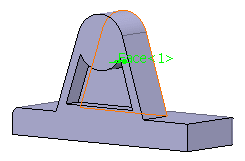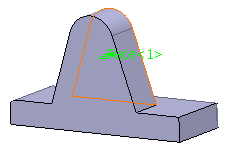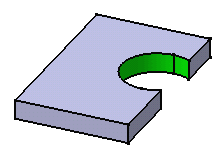Making the Most of the App | ||
| ||
Order of Feature Recognition
The order in which you should recognize features must be the reverse of one of the possible orders of feature creation. For example, if you try to recognize a pad after selecting this face, the operation will fail.

To recognize the pad, first of all you must recognize the pocket so as to remove the faces, and then, you will be able to recognize the pad.

Identifying Multiple Solutions
The app provides a fine control over the way a set of faces is recognized as a given feature. For example, you can control the feature to be recognized using options such as Up to face or by selecting edges instead of faces for pad or pocket recognition. However, there are still cases where there are different ways in which faces can be removed.
This is the case of this 3D shape:

There are several ways of recognizing the green face. You can recognize it as a groove, as a hole or as a pocket. If you decide to recognize it as a pocket, again you can choose between two solutions. The final simplified solid you can obtain is either a pocket whose profile is a complete circle or an arc.
Which is the best solution?
To answer this question, you need to consider different factors many of which depend on the context. Giving a general answer is therefore not possible. However, the app attempts to provide the solution that represents the most intuitive way of creating the 3D shape. Thus, in our example, the second solution is the solution provided by the app.
Chaining Faces for Boolean Operations
Since there is no chaining for Boolean recognition, you can make use of the chaining functionality of other feature types. For example, if the Boolean feature to be recognized is somewhat like a groove, then you can choose Groove and pick a face with the Chain Faces option on. This will lead to several faces getting selected. If now you switch the feature type to Boolean, the faces will still be selected, and can be used for Boolean recognition.
Selecting Faces
- It might be sometimes difficult to select the faces you need for recognition. Some 3D shapes may require that you hide bodies prior to selecting the faces.
- Only faces and edges belonging to the In Work Object can be selected.
- You can select only faces that are appropriate for the feature type being recognized. For example, you cannot select planar faces for fillet recognition.
Handling Deactivated Features Created by Part Design Feature Recognition
Most often, deactivated features are not due to the app failures, it is just that whenever the app cannot create the features it recognizes, it deactivates those features. This behavior is valid for any feature type. What you need to do, is edit the feature and add the right specifications as much as possible.